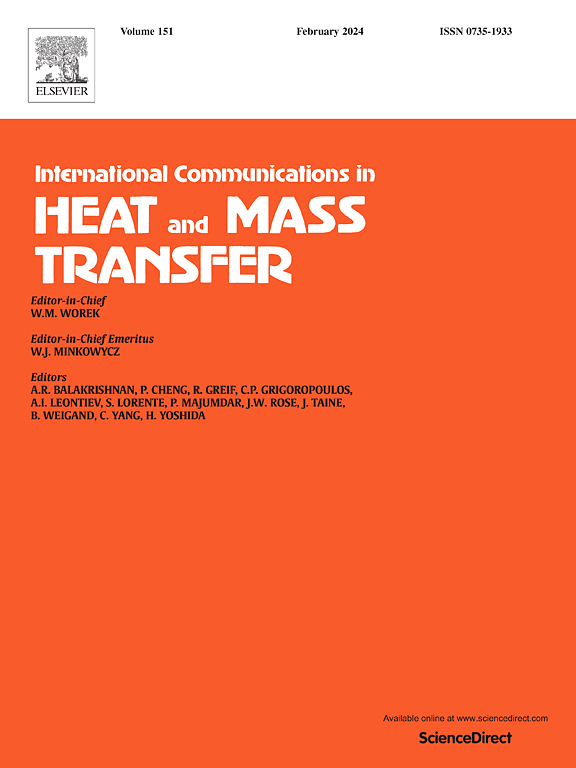Prediction of heat transfer characteristics and energy efficiency of a PVT solar collector with corrugated-tube absorber using artificial neural network and group method data handling models
IF 6.4
2区 工程技术
Q1 MECHANICS
International Communications in Heat and Mass Transfer
Pub Date : 2024-07-22
DOI:10.1016/j.icheatmasstransfer.2024.107829
引用次数: 0
Abstract
Photovoltaic thermal (PVT) systems offer an attractive prospect to produce thermal and electricity powers when used as the building envelope. The present numerical analysis is performed intending to evaluate the thermal, electrical, and overall efficiencies of a PVT unit with a corrugated serpentine absorber tube filled with the AO/water nanofluid. The influence of Reynolds number () and nanoparticle concentration () on the performance metrics of the system is analyzed. The result indicated that within the range of 0–1%, the increment in from 500 to 2000 diminishes the PV panel temperature by 3.13–3.32%, while pressure drop boosts by 5480.95–5580.06%. The increase in from 0% to 1%, however, declines the PV panel temperature and pumping power by 0.43–0.62% and 1.25–2.97%, respectively. The range of changes in the overall efficiency was 60.38–90.45%, the maximum and minimum of which belong to = 2000&=1% and = 500&=0%, respectively. The results of artificial neural network (ANN) modeling presented an accurate function for estimation of the overall efficiency of the studied PVT unit based on the and with the R-squared coefficient of determination of R = 0.99602.利用人工神经网络和群法数据处理模型预测带波纹管吸收器的 PVT 太阳能集热器的传热特性和能效
光伏热能(PVT)系统作为建筑围护结构,在产生热能和电能方面具有诱人的前景。本研究进行了数值分析,旨在评估装有充满 AO/水纳米流体的波纹蛇形吸收管的光伏热发电装置的热效率、电效率和总体效率。分析了雷诺数()和纳米粒子浓度()对系统性能指标的影响。结果表明,在 0-1% 的范围内,从 500 到 2000 的增量会使光伏板温度降低 3.13-3.32%,而压降增加 5480.95-5580.06%。然而,从 0% 增加到 1%,光伏板温度和泵功率分别下降了 0.43-0.62% 和 1.25-2.97%。总效率的变化范围为 60.38-90.45%,最大值和最小值分别为 = 2000&=1% 和 = 500&=0%。人工神经网络(ANN)建模结果表明,所研究的 PVT 机组的总效率估算函数精确,基于和,R 平方决定系数为 R = 0.99602。
本文章由计算机程序翻译,如有差异,请以英文原文为准。
求助全文
约1分钟内获得全文
求助全文
来源期刊
CiteScore
11.00
自引率
10.00%
发文量
648
审稿时长
32 days
期刊介绍:
International Communications in Heat and Mass Transfer serves as a world forum for the rapid dissemination of new ideas, new measurement techniques, preliminary findings of ongoing investigations, discussions, and criticisms in the field of heat and mass transfer. Two types of manuscript will be considered for publication: communications (short reports of new work or discussions of work which has already been published) and summaries (abstracts of reports, theses or manuscripts which are too long for publication in full). Together with its companion publication, International Journal of Heat and Mass Transfer, with which it shares the same Board of Editors, this journal is read by research workers and engineers throughout the world.
文献相关原料
| 公司名称 | 产品信息 | 采购帮参考价格 |
|---|

 求助内容:
求助内容: 应助结果提醒方式:
应助结果提醒方式:


